

Workshops and training courses in live sound engineering for concerts, festivals and events

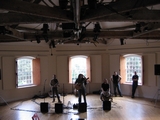
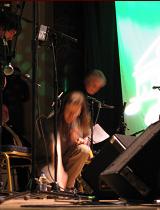
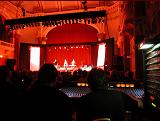
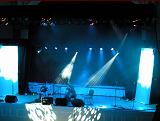
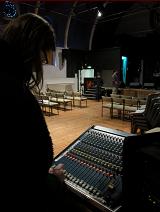
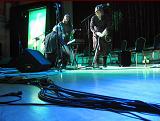
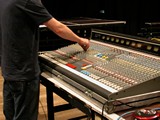
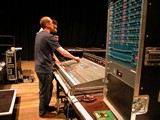
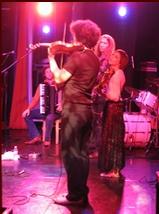
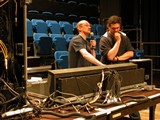
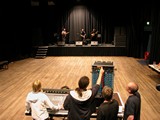
Ok so you are after more information about my course....well here goes!
The world of live sound is a fascinating one. It has many, many aspects. My training day focuses on, in my mind, THE single most important component of a live sound system - YOU the sound engineer! Let me explain...
Professional approach
I'm under no illusion (and you shouldn't be either) that after a 1 day live sound course you will be able to go out and mix for Oasis for example (should you so desire!). 99% of being a live sound engineer is experience learned. You simply have to have mixed in 100 different types of room/system/band to know what can and can't be achieved from the room, the system, and the band. This is how one develops ones "ear".
What I try to emphasise and instil on my course is that having a professional approach really counts. There are way too many variables for me to cover every possible situation. You are at the first rung of the learning ladder. I'd much rather arm you with a few basics, and an approach that allows you to deal with any situation in a calm, professional manner. Much of this comes from allowing plenty of time and being methodical (almost obsessively so). It is very easy to overlook something that can have disastrous consequences (did I plug that guitar in the correct hole?....BANG!). Attention to detail is paramount. Then when you feel on-top of things technically, it frees your mind up to focus outward and handle the bands, event organisers, and audience in a calm, professional manner. After all, this is what will get you booked to do the same job again and again. Even if the sound is slightly less than perfect!
Practical, practical, practical.
Everything about my course is practical. I book a sound system, venue, and band. There is no theory (unless you ask). I wont be discussing at length the physics of sound. This is outside the focus of my live sound workshops, and to a degree, is not necessary knowledge, and can lead you down the wrong path ( I saw a sound engineer once placing a sub-bass cabinet in a fire escape route because he had "calculated" this would be the best choice of placement for his speaker. The venue manager quickly "calculated" otherwise!)
Stage changes
An absolutely critical aspect of live sound is the speed in which a stage can be "turned around" (i.e go from one band to another). Again, no single bit of kit is going to help you out here! Its all about the placement and organisation of numerous microphones, stands, leads and most importantly channel numbers. It can be all too easy to get in a real mess! This can have disastrous, stressful consequences, because every band will expect a full sound check, and as the sound team, we must be able to deliver this WITHOUT running over time as this will have knock on effects throughout the rest of the festival day programme. It really easy to loose time - its really hard to make it back up!
I have spent the most part of my sound engineering life working a folk/acoustic festivals that really challenge this aspect. Typically, no two bands have the same line-up of instruments, and changeover times can be from as little as 30seconds, ranging up to a luxurious five minutes!
From this, I developed a system (all PA companies will have their own - some good...some er...... not so good!) I can't explain my system here (its not an industrial secret, its just not easy to write down!) I do, however, cover this system on my live sound training day. You too will be able to turn a stage around in under 5 mins with no missing channels, or confused moments!
Ear not Gear
In an industry that (of late) seems to be inundated with the latest technologies (the line array epidemic, digital desks, digital speaker management systems...the list goes on) I believe that this has moved the focus away from the skill of the technician, and placed the "belief" that good sound can only be achieved through the "top-end" equipment. This thinking is the result of very clever marketing pushes from the main manufacturers - making us more aware of acoustic issues and problems that surprise surprise, their latest bit-of-kit overcomes beautifully (at a price tag).
Now, don't get me wrong, I do embrace the advances in technology - its an absolute necessity in this game to move with the times, and I agree that we should wherever possible use respectable, trusted brands to ensure our concert goes without a hitch. What I do object to is the concept that one should rely purely on the gear to be responsible for the sound.
I've toured extensively, on systems large and small, and I can categorically say that I have NEVER run a live sound system "flat". In other words there are ALWAYS improvements to be made. (primarily through the use of a graphic equaliser)
This art is becoming "lost" as more and more engineers buy into the high end speaker marketing philosophy. The number of times I've walked into a concert in an acoustically challenging space to see the sound engineer running the FOH EQ flat because "its d&b" or whatever, and "shouldn't need EQing".
I've just read a psychological investigation suggesting that sight and expectation has 20 times more emphasis over the other sense. So much so that a test was performed on those wine-tasting experts (" I'm tasting elderflower, a hint of spice, then an after-taste of charred leather" ) The test had them drink two glasses of wine, one from a really expensive bottle, one from a table wine bottle. Every taster (of 54) preferred the expensive wine...you guessed it .. it was the SAME wine in different bottles!
Read more here
I wonder how much of this "perceived excellence" occurs in the sound system world....?
It never ceases to amaze me when I talk to fellow professional sound engineers how often we will have the discussion of "Which sound system do you prefer?...I love L-Acoustics, Funktion 1 is ok, d&b Q series is wonderful, I hate the mid-highs on Martin Audio"
.....well change the way the mid-highs sound for crying out loud!
I simply don't have a system I prefer (by way of how it sounds) because I make each and every system I use sound more or less the same - for the best sound possible, to my taste. I do, on the other hand, have systems I prefer by means of coverage, weight, ease of rigging, efficiency etc ... but never sound quality.
The problem with adopting the "gear-snob" approach to live sound, is that as a working sound engineer on tour, you will be expected to work with WHATEVER you find yourself faced with. Even when I've been doing really high profile acts touring abroad or whatever, I can guarantee that at some point on the tour, I will walk in to some small arts centre gig (maybe a stop-gap date) and be faced with THE most appalling sound system known to man!
What should one do in situation like this?! Demand d&b or the band wont play?! Are you sure you want to upset their contract with the venue? their agent? their manager?......not the best option. What you have to do it obtain the best results possible with the equipment available.
This is the true skill of the live sound engineer. Your own ears are by far the best "bit-of-kit" you can have.
The world of live sound is a fascinating one. It has many, many aspects. My training day focuses on, in my mind, THE single most important component of a live sound system - YOU the sound engineer! Let me explain...
Professional approach
I'm under no illusion (and you shouldn't be either) that after a 1 day live sound course you will be able to go out and mix for Oasis for example (should you so desire!). 99% of being a live sound engineer is experience learned. You simply have to have mixed in 100 different types of room/system/band to know what can and can't be achieved from the room, the system, and the band. This is how one develops ones "ear".
What I try to emphasise and instil on my course is that having a professional approach really counts. There are way too many variables for me to cover every possible situation. You are at the first rung of the learning ladder. I'd much rather arm you with a few basics, and an approach that allows you to deal with any situation in a calm, professional manner. Much of this comes from allowing plenty of time and being methodical (almost obsessively so). It is very easy to overlook something that can have disastrous consequences (did I plug that guitar in the correct hole?....BANG!). Attention to detail is paramount. Then when you feel on-top of things technically, it frees your mind up to focus outward and handle the bands, event organisers, and audience in a calm, professional manner. After all, this is what will get you booked to do the same job again and again. Even if the sound is slightly less than perfect!
Practical, practical, practical.
Everything about my course is practical. I book a sound system, venue, and band. There is no theory (unless you ask). I wont be discussing at length the physics of sound. This is outside the focus of my live sound workshops, and to a degree, is not necessary knowledge, and can lead you down the wrong path ( I saw a sound engineer once placing a sub-bass cabinet in a fire escape route because he had "calculated" this would be the best choice of placement for his speaker. The venue manager quickly "calculated" otherwise!)
Stage changes
An absolutely critical aspect of live sound is the speed in which a stage can be "turned around" (i.e go from one band to another). Again, no single bit of kit is going to help you out here! Its all about the placement and organisation of numerous microphones, stands, leads and most importantly channel numbers. It can be all too easy to get in a real mess! This can have disastrous, stressful consequences, because every band will expect a full sound check, and as the sound team, we must be able to deliver this WITHOUT running over time as this will have knock on effects throughout the rest of the festival day programme. It really easy to loose time - its really hard to make it back up!
I have spent the most part of my sound engineering life working a folk/acoustic festivals that really challenge this aspect. Typically, no two bands have the same line-up of instruments, and changeover times can be from as little as 30seconds, ranging up to a luxurious five minutes!
From this, I developed a system (all PA companies will have their own - some good...some er...... not so good!) I can't explain my system here (its not an industrial secret, its just not easy to write down!) I do, however, cover this system on my live sound training day. You too will be able to turn a stage around in under 5 mins with no missing channels, or confused moments!
Ear not Gear
In an industry that (of late) seems to be inundated with the latest technologies (the line array epidemic, digital desks, digital speaker management systems...the list goes on) I believe that this has moved the focus away from the skill of the technician, and placed the "belief" that good sound can only be achieved through the "top-end" equipment. This thinking is the result of very clever marketing pushes from the main manufacturers - making us more aware of acoustic issues and problems that surprise surprise, their latest bit-of-kit overcomes beautifully (at a price tag).
Now, don't get me wrong, I do embrace the advances in technology - its an absolute necessity in this game to move with the times, and I agree that we should wherever possible use respectable, trusted brands to ensure our concert goes without a hitch. What I do object to is the concept that one should rely purely on the gear to be responsible for the sound.
I've toured extensively, on systems large and small, and I can categorically say that I have NEVER run a live sound system "flat". In other words there are ALWAYS improvements to be made. (primarily through the use of a graphic equaliser)
This art is becoming "lost" as more and more engineers buy into the high end speaker marketing philosophy. The number of times I've walked into a concert in an acoustically challenging space to see the sound engineer running the FOH EQ flat because "its d&b" or whatever, and "shouldn't need EQing".
I've just read a psychological investigation suggesting that sight and expectation has 20 times more emphasis over the other sense. So much so that a test was performed on those wine-tasting experts (" I'm tasting elderflower, a hint of spice, then an after-taste of charred leather" ) The test had them drink two glasses of wine, one from a really expensive bottle, one from a table wine bottle. Every taster (of 54) preferred the expensive wine...you guessed it .. it was the SAME wine in different bottles!
Read more here
I wonder how much of this "perceived excellence" occurs in the sound system world....?
It never ceases to amaze me when I talk to fellow professional sound engineers how often we will have the discussion of "Which sound system do you prefer?...I love L-Acoustics, Funktion 1 is ok, d&b Q series is wonderful, I hate the mid-highs on Martin Audio"
.....well change the way the mid-highs sound for crying out loud!
I simply don't have a system I prefer (by way of how it sounds) because I make each and every system I use sound more or less the same - for the best sound possible, to my taste. I do, on the other hand, have systems I prefer by means of coverage, weight, ease of rigging, efficiency etc ... but never sound quality.
The problem with adopting the "gear-snob" approach to live sound, is that as a working sound engineer on tour, you will be expected to work with WHATEVER you find yourself faced with. Even when I've been doing really high profile acts touring abroad or whatever, I can guarantee that at some point on the tour, I will walk in to some small arts centre gig (maybe a stop-gap date) and be faced with THE most appalling sound system known to man!
What should one do in situation like this?! Demand d&b or the band wont play?! Are you sure you want to upset their contract with the venue? their agent? their manager?......not the best option. What you have to do it obtain the best results possible with the equipment available.
This is the true skill of the live sound engineer. Your own ears are by far the best "bit-of-kit" you can have.
Contact: 0800 6129089